7 of The Best Types of Puzzles for Alzheimer’s Patients

Puzzles for Alzheimer’s patients are engaging and fun. They are not overly complicated but provide enough brain challenge to keep the mind feeling challenged. Puzzles for Alzheimer’s patients can be enjoyed by many, if not most, types of people.
If you have a loved one struggling with Alzheimer’s, you want to provide them with the most helpful tools and activities possible to assist in maintaining their cognitive abilities. Playing with the puzzle is among the best activities for a loved one to help keep their mind active and challenged.
There are many puzzles for Alzheimer’s patients to choose from, and you must try to find a puzzle that your loved one will enjoy. In this article, we have compiled a list of the eight best types of puzzles that you can use for your loved one who has Alzheimer’s.
The Known Benefits of Puzzles for Alzheimer’s Patients:
Alzheimer’s disease is a type of dementia that causes memory loss, cognition problems, and challenges with language. It is a serious disease that can have devastating effects on the progressive loss of mental ability.
Fortunately, there are many puzzles available to keep the mind active and help keep the progression of Alzheimer’s at bay. Puzzles provide many benefits for Alzheimer’s patients, and it is important to make sure you introduce them as early as possible to your loved ones.
1. Puzzles Have a Meditative Quality
Puzzles can help relieve stress and mental fatigue. Seniors who spend time playing with puzzles will feel less stressed, less bored, and more energized. The repetitive nature of a puzzle can soothe the mind and calm the body as you move from one step to another. Puzzles also allow seniors to go deep into their thoughts and reflect on their past experiences.
2. Puzzles Can Keep Senior’s Hands Busy
For seniors, keeping busy with their hands is an excellent way to keep their minds active and stimulated. Puzzles provide the perfect opportunity for seniors to keep their hands busy while challenging their minds.
3. Puzzles Can Improve Cognition

When playing a puzzle, seniors will use their brains in an active way. Many puzzles need to be played in a certain order or pattern, and it requires a senior to use logic, memory, and problem-solving skills to complete the puzzle. Puzzles aren’t going to cure Alzheimer’s, of course, nor will they stop the disease from progressing. However, the short-term advantages are still worthwhile for the elderly and their family.
4. Puzzles Offer a Way to Connect Socially
Seniors who play with puzzles are more likely to make a new friend or two. Puzzles allow seniors to work with their family members in a different environment, so they can better maintain their memory and keep their minds active.
5. Puzzles Can Improve Mood In Seniors
Puzzle games can even help seniors who have Alzheimer’s feel more optimistic about the future. The repetition and challenge of a puzzle game can allow seniors to gain a sense of pride and accomplishment.
How to Match Puzzles to The Seniors’ Needs
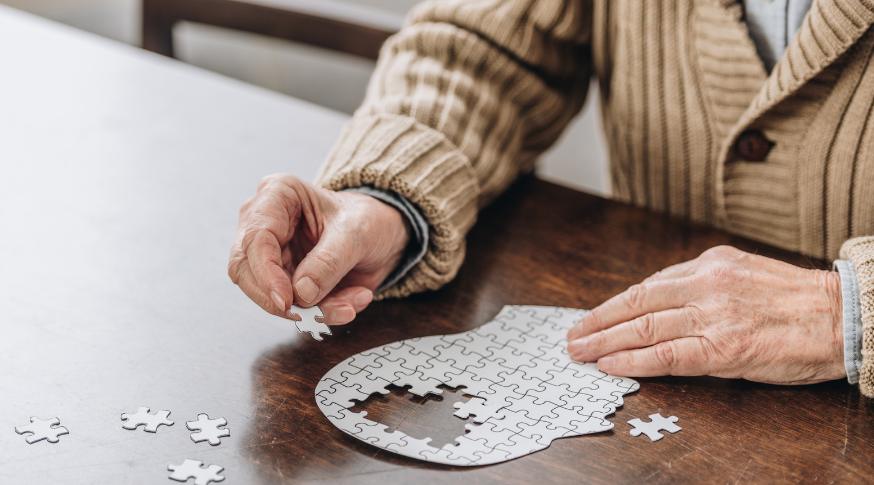
When selecting puzzles for people with Alzheimer’s, matching the puzzle to the elderly needs and abilities is essential.
Seniors will likely become frustrated if the puzzle is too challenging to play. Selecting a puzzle that is too simple is frustrating as well.
For instance, some older adults in the early stages of dementia can complete regular puzzles without difficulty. As the condition progresses, puzzles may get difficult to complete, so gradually shifting to simpler ones may be vital.
- Notice How They Do With Puzzles – Observe how your loved one interacts with the puzzle. If seniors have difficulty working on the puzzle, it is better to switch them to a simpler one than to frustrate them. Watch for frustration indicators such as groaning, sighing, and giving up completely.
- Step Down Slowly – If your loved one with Alzheimer’s can’t quite complete an 800-piece puzzle, you don’t immediately want to step them down to a 15-piece dementia puzzle. Doing so is not likely to go down well. It is much better to make the changes gradually. It might mean you go from 800 to 600 pieces or that you search for a puzzle with more obvious color and piece variations. Shifting gradually is kinder to the older adults and makes it easier to discover the right puzzle for their current level.
- Ask Your Senior Loved One’s Opinion – The essential thing to do is to listen carefully to your senior loved one’s opinion on the puzzle you are buying. The puzzles for dementia need to be enjoyable. They should desire to play the puzzles and will look forward to it. Ask them their favorite colors, or ask them to choose the puzzle they prefer in your presence. Only then can you get the perfect match of the puzzle for your loved one.
7 of The Best Types of Puzzles for Alzheimer’s Patients
1. Relish Puzzles

Relish is a well-known company that manufactures products for dementia. Their products are carefully designed, and the company thinks about how needs change as dementia progresses.
Relish store provides puzzles ranging from thirteen to one hundred pieces. The puzzles tend to have vibrant contrasting colors and nostalgic designs, making them a pleasure for Alzheimer’s patients.
There are backing boards and an image to guide the older adults, limiting the chance that they’ll be overwhelmed. The thirteen-piece puzzles are extremely interesting, as Relish concentrates on using large pieces that are shaped differently and are easy to handle. Also another fantastic feature is that the boxes avoid the word dementia. It could be helpful for sensitive elderly.
2. Family Puzzles
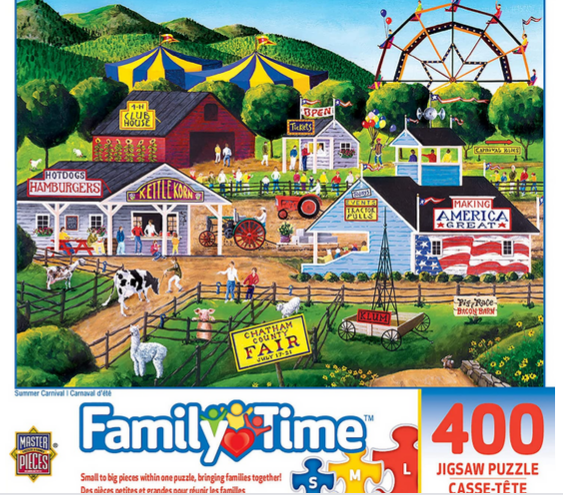
This is an excellent puzzle for Dementia patients as it provides a fun factor. The designs are interesting, and it is easy to set the puzzles up. These puzzles have varying shapes to make a variety of tight and thick interlocking pieces. Ensuring a variety of fun challenges with every puzzle! The good thing about this product is it’s environmentally friendly; the puzzles are made from a hundred percent recycled materials and soy-based inks for eco-friendliness.
Also, this puzzle comes with a poster for a detailed view to help guide Alzheimer’s patients through solving this puzzle. So, the family and the senior could spend quality time together doing this puzzle.
3. Puzzles Based on the Past
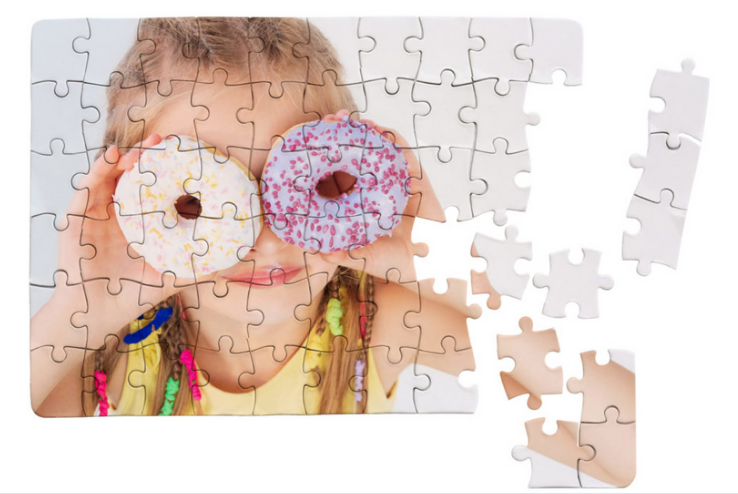
You can take one step further and get custom puzzles created based on an image or picture. Doing so allows you to select images that mean something to your elderly loved one. It will help people with dementia recall certain memories before they are affected with Alzheimer’s disease. This can give them a sense of purpose while they create a memory that will last forever!
However, any custom puzzle should meet the needs of a senior with dementia. It includes having large easy-to-handle puzzle pieces and not being overly difficult.
4. Sequenced Jigsaw Puzzle
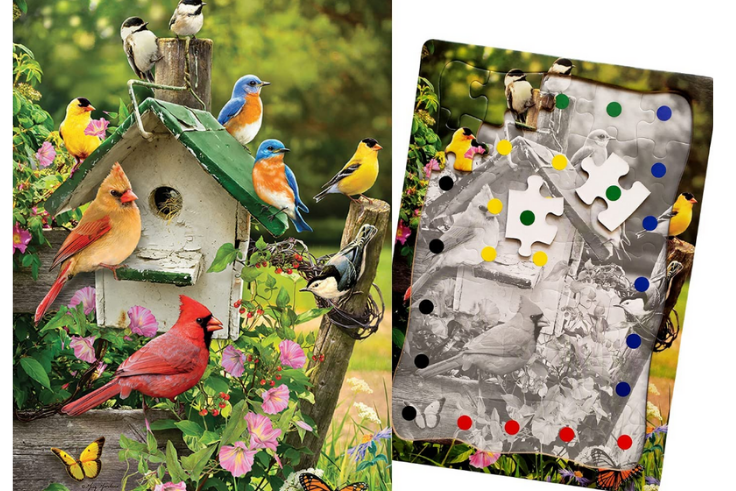
It is a great addition to any puzzle collection! This unique jigsaw puzzle is an ideal gift for senior loved ones who are affected by dementia. And it is another way to make puzzles easier for the elderly.
Sequenced Jigsaw Puzzle has a version of the image on the backing board, so older adults just need to match the pieces to the image. Puzzle pieces may also be color coded to help guide Alzheimer’s patients to complete the puzzle on their own.
Many such puzzles also have instructions about how caregivers or family members can adapt the puzzle to match the older adult’s needs. This way you can be sure they have a wonderful experience with just the suitable amount of difficulty.
5. Match The Shapes
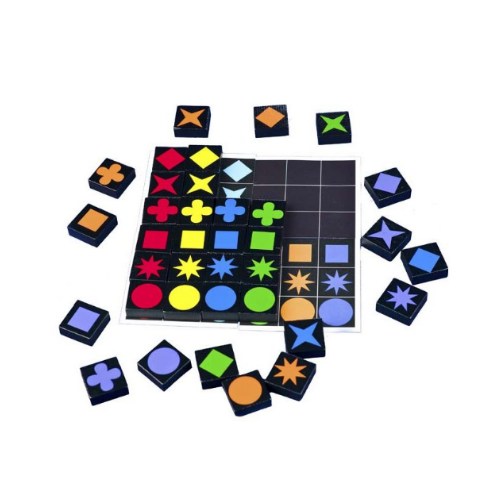
The colorful shapes and figures on the black tiles certainly draw attention. They are enjoyable to look at and handle and provide the basis for a variety of challenging matching activities for people with Alzheimer’s.
It is one of the best puzzles for Alzheimer’s because it helps stimulate memory and cognitive skills. This well-designed puzzle is made from a high-quality, durable, and robust material.
The instructions detail how to utilize each set to find a suitable level of challenge. Even if the senior can’t follow the templates, the puzzle pieces are fun to match, stack, and sort.
6. Wooden Tangram Alzheimer’s Puzzle
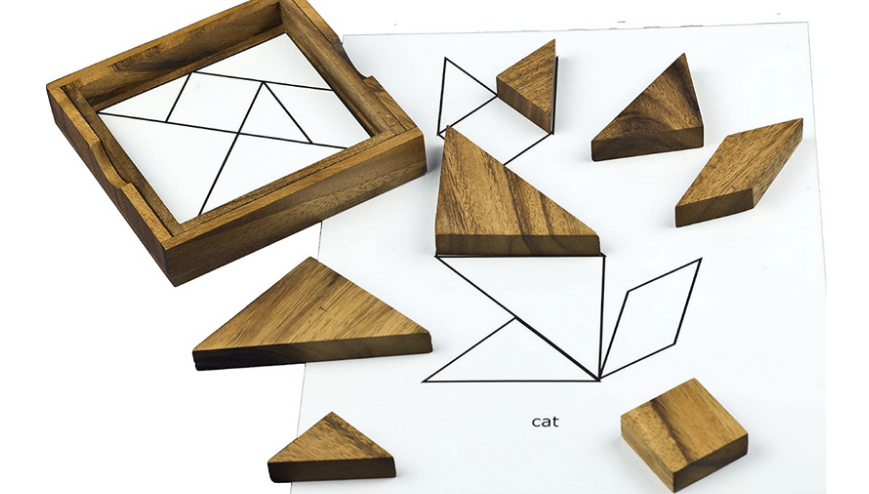
These puzzles are a different style you need to consider. Ones designed for seniors with dementia tend to be simple and have clear outlines for where each piece must go. The Wooden Tangram Alzheimer’s Puzzle itself simply involves matching the shapes. This style may be too simple for some seniors with Alzheimer’s, yet it could be perfect for others. The size and shape of the individual pieces are attractive and fit well in hand.
7. Puzzle-Like Games
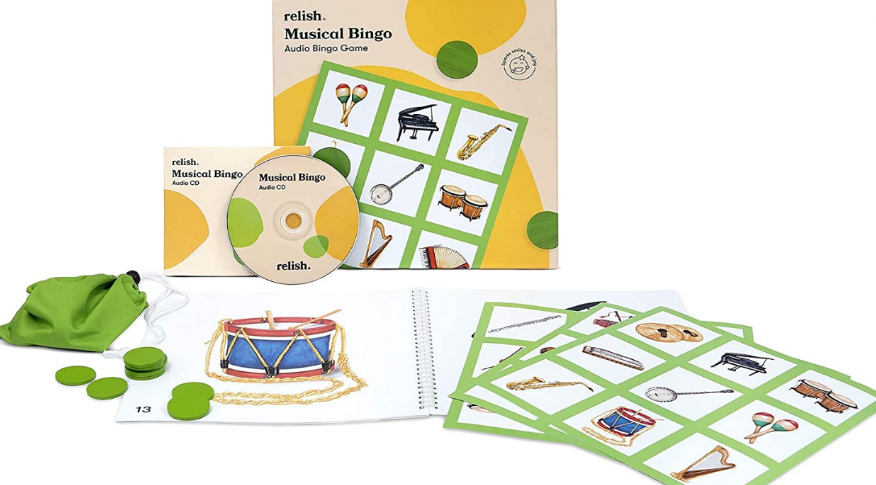
While we have introduced some amazing dementia puzzle games above, there are a number of other puzzle-like games that you can use. Again, the main goal is to match the level of difficulty to the older adult’s needs.
Most well-known benefits are the same as with puzzles for Alzheimer’s patients. In particular, a puzzle-like game can help calm older adults, give patients mental stimulation, give them something to work with their hands, and even give them a sense of control.
Some of the best Puzzle-like games for Alzheimer’s patients include:
Final Thoughts
Discovering that your loved one has Alzheimer’s disease is a difficult time. And it can be even more heartbreaking to see them struggle with their memory and abilities. But you can get through these challenging times by investing in some fun puzzles for Alzheimer’s patients.
There is a large number of puzzles available for seniors with Alzheimer’s disease. Undoubtedly, they help to facilitate the older adult’s memory and provide a good way of spending quality time with them. While puzzles may not cure Alzheimer’s, they can help slow the illness’s progression.
However, there are times that you are not always there to help them with the puzzles and spend quality time together. In these cases, a need for a reliable elderly companion is necessary. Serenity Senior Care is a great option to help their loved ones with Alzheimer’s. We offer companion support services that can help your senior loved ones accomplish daily tasks. If you want to learn more about our services, call us at 973-338-0124 and find out how we can help you.


